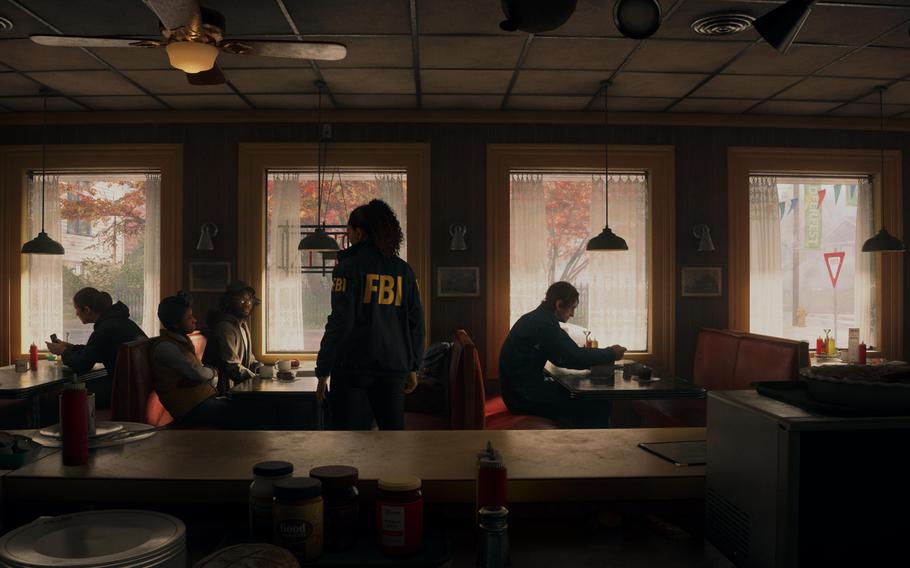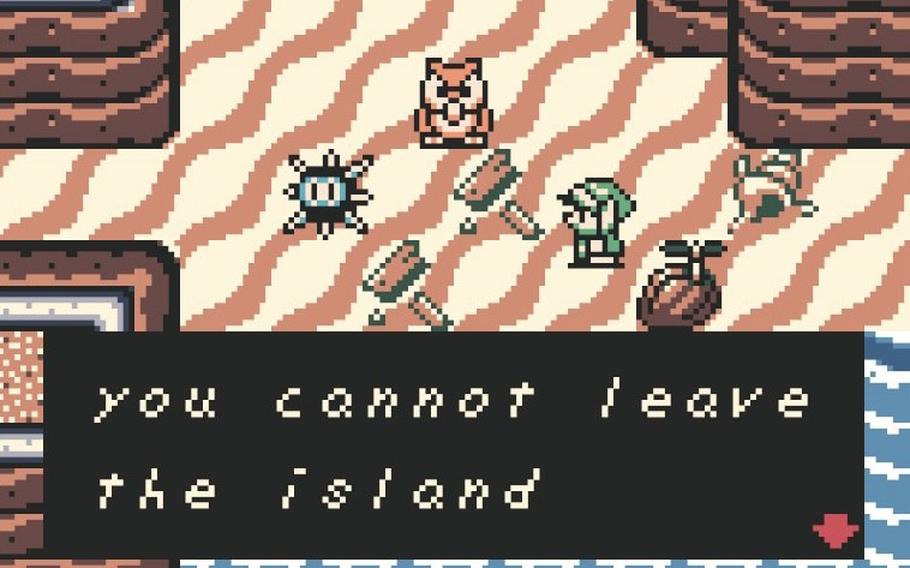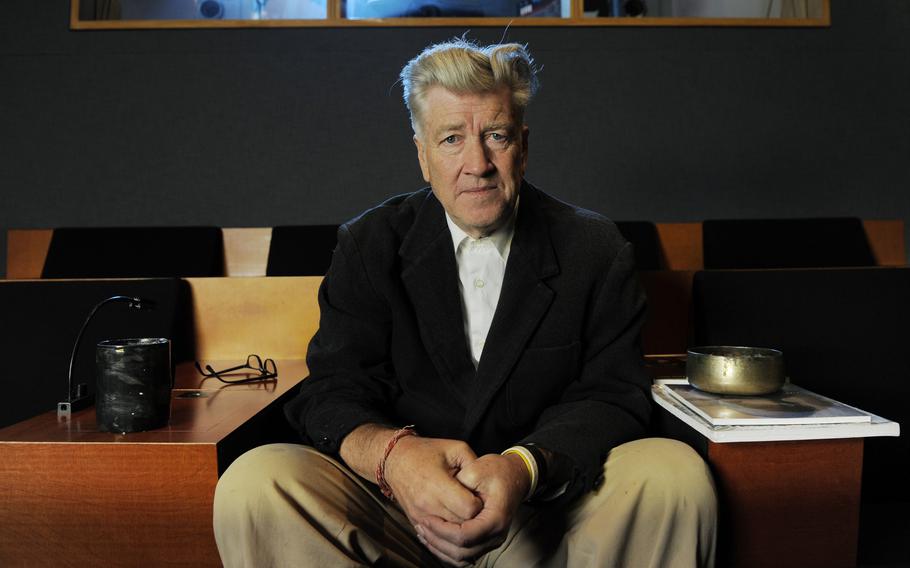
Alan Wake 2 evokes “Twin Peaks” and “Lost Highway” by featuring multiple protagonists, including two coffee-addicted FBI agents investigating bizarre murders in a sleepy Pacific Northwest town. (Remedy Entertainment)
Besides George Lucas, David Lynch is arguably the film and TV director with the most influence on video games.
To be “Lynchian” in part is to bewitch the audience in a dream state, and video games are a medium that can viscerally re-create moving through imagination. Plenty of games take direct inspiration from his work. But Lynch himself understood the connection. In 2000 he directed a surreal PlayStation 2 commercial, 60 seconds of flames, blaring alarms and impossible imagery.
Lynch once took interest in creating a game, Woodcutters From Fiery Ships, a compelling but doomed project with a Japanese developer of PC adventure games. Lynch described it as a “conundrum thing … a beautiful kind of place to put yourself. You try to make a little bit of a mystery and a bit of a story, but you want it to be able to bend back upon itself and get lost, really get lost.” He told the Guardian the project was “blocked from the get-go” because players wouldn’t be interested in such a thing. Two decades of hindsight and history would prove that instinct wrong, as some of the most popular and influential games would carry that spirit.
The most famous example might surprise, but Nintendo’s Legend of Zelda series often played with surrealism. Its first real attempt - as well as its first major shot at a story breaking the confines of princess rescues - was 1993’s Game Boy game Link’s Awakening. Nintendo even brought in “Twin Peaks” co-creator Mark Frost for a conversation about the game’s story. Later, on the Nintendo 64, Majora’s Mask questioned the roles each of us play through the masks we wear. These two games remain the most tragic tales ever told by the House of Mario.
Lynch never delved completely into horror, but his DNA is all over the genre, particularly in video games. Silent Hill, released in 1999 for the first PlayStation, eschewed the horror game’s fascination with creatures and zombies to create something far more paranoid and unnerving, and a motley crew of Konami developers looked to Lynch for guidance. Last year, art director Masahiro Ito confirmed that early ideas for Silent Hill 2 were inspired by Lynch’s film “Lost Highway.” The Silent Hill series itself inspired decades of psychological horror games, all the way to last year’s indie masterpiece Mouthwashing.

“Twin Peaks” co-creator Mark Frost weighed in on the story of The Legend of Zelda: Link’s Awakening. (Nintendo)
That even the famously puritan Nintendo joined this wave isn’t so surprising. In the 1990s, Japan’s obsession with “Twin Peaks” ignited a sort of Lynchmania, with people even re-creating funerals for Laura Palmer. The show’s depiction of Americana fascinated Japan and countless would-be video game creators.
“Twin Peaks” is all over Final Fantasy VII, the groundbreaking 1997 PlayStation game that might be the medium’s first big-budget project. Director Yoshinori Kitase has said “Twin Peaks” is his favorite show of all time, and his game’s plot dives deep into the nature of consciousness and self-identity. Fans have noted some strong musical ties, too: On YouTube, one playlist collects songs from the show that sound suspiciously similar to the game’s jazzier score.
In 2010, eccentric game director Hidetaka Suehiro, most famously known as Swery65, would release Deadly Premonition, a retelling of “Twin Peaks” that coincidentally uses gameplay elements from Majora’s Mask to create a township of people with schedules and odd behaviors.
And before he became arguably the most popular and celebrated game director in the world, a young Hideo Kojima criticized U.S. military fetishism by lacing it with supernatural wickedness in his Metal Gear series.
In 2001, Kojima imagined an all-too-familiar future of a digital hellscape poisoned with misinformation. For Lynch, the horror lies in life’s uncertainties, while Kojima held a mirror to our tech-obsessed future where AI builds hell on earth. Kojima said in 2018: “Thank you Lynch-sensei. You gave me courage.”

Filmmaker David Lynch poses for a portrait in his private screening room in Los Angeles on Sept. 9, 2010. (AP)
The list of games Lynch inspired are countless (the Persona series is another prominent example). But besides Kojima, acclaimed Finnish game director Sam Lake is perhaps gaming’s most successful creative in evoking Lynch. His thriller series Alan Wake takes place in Lynch’s home region of the Pacific Northwest, like “Twin Peaks,” and the second game stars a pair of coffee-addicted and awkward FBI agents.
“There would not be Alan Wake without him,” Lake said of Lynch in his acceptance speech of the Andrew Yoon Legend Award at the New York Game Awards on Tuesday.
“A journey into a secret mystery. I think this is what we seek - a presence we sometimes fleetingly sense in our everyday lives, but something that is invisible to us, denied from us,” Lake said. “We suspect it’s there, but we are blind to it, and we can’t reach it until a doorway opens and allows us to pursue it and journey into a hidden world. It can be wonderful, and it can be terrifying.”
Even though they never met, it’s clear Lake has a firm grasp of why Lynch’s influence is felt across all artistic mediums. Alan Wake 2 was The Washington Post’s best game of 2023 because of its mixed-media approach combining film, pop music, literature and gameplay to create an interactive puzzle box of the collective consciousness.
It calls to mind Lynch’s approach to creating evocative sounds. “Sound is, and I think every director would realize this, 50 percent of the picture,” Lynch said in a 2014 interview with the Paris Review about his longtime sound editor, the late Alan Splet. “To get it married to the picture is the trick.”
Lake evoked that spirit in his speech. “There is specific craft to each of these mediums, and yet they overlap. I’d like to think this pursuit is universal in art and entertainment,” he said. What makes games special, he said - their blend of mediums, their interactivity - is in service to “a concrete journey you make, and the secret mystery is something you actively work on, to look for and piece together, all of which us draws us and makes us an active part of the experience, fully engaged.”